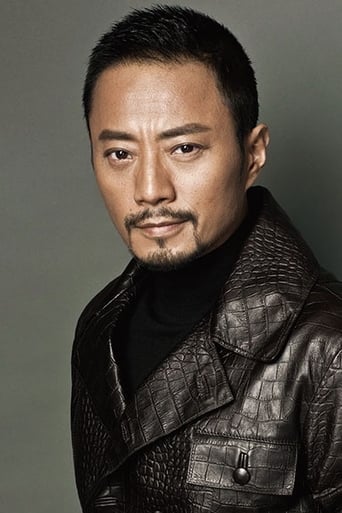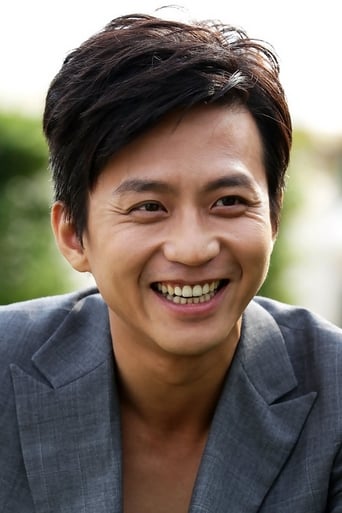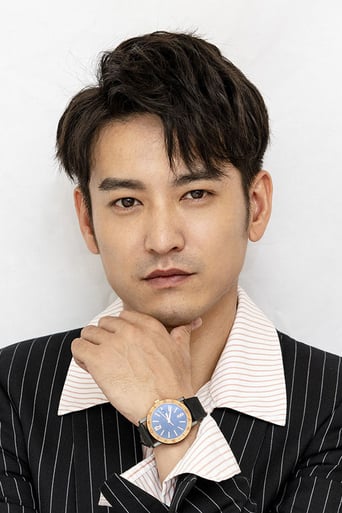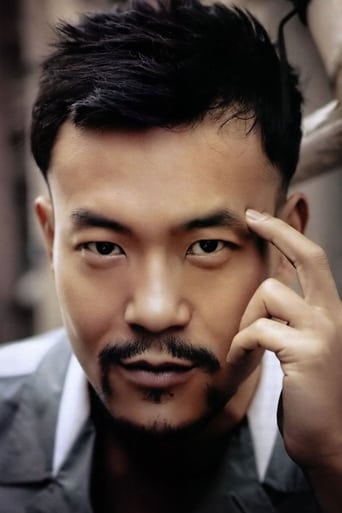ada
the leading man is my tpye
Majorthebys
Charming and brutal
Ogosmith
Each character in this movie — down to the smallest one — is an individual rather than a type, prone to spontaneous changes of mood and sometimes amusing outbursts of pettiness or ill humor.
Rio Hayward
All of these films share one commonality, that being a kind of emotional center that humanizes a cast of monsters.
TheBigSick
I was in tears when I first watched this film ten years ago. Recently I watched it again and I still could not stop crying. The persistence of the central figure Gu Zidi (Zhang Hanyu), and the the humanity and anti-war theme shine through the film. Zhang Hanyu is amazing, and arguably gives the best performance of his career. The music score, makeup and the film editing are noteworthy.
kluseba
"Assembly" is a Chinese war movie made in collaboration with the special effects and stunt coordinators from the Korean war epic "Tae Guk Gi: The Brotherhood Of War" which is one of the greatest modern war movies along with "My Way".Despite the great war scenes, "Assembly" doesn't come close to the high quality of the aforementioned titles.The viewer is thrown too fast into the story. It's 1948 and wartime in China. We follow the fate of Captain Gu Zidi of the Ninth Company. That's where some viewers might already feel mixed up. Who is at war and why? The movie doesn't explain this issue properly. Let me tell you that we are in the middle of the second wave of the Chinese Civil War. By the end of the Second Sino-Japanese which basically was the Japanese invasion of China during World War II, Communist troops of the later People's Republic of China and nationalist troops of the Kuomintang and the later Republic of China relocated to Taiwan picked up their hostilities again that first erupted back in 1927 and that only came to an end in 1949 when the Communists won. Captain Gu Zidi is representing the Communists and is invading a small town occupied by the Nationalists. He wins the battle with severe casualties. When his political officer dies, he loses his temper and orders in vain to shoot the surviving war prisoners. This brutal attempt leads to a short punishment where Gu Zidi meets an intellectual pacifist and teacher. The two different men befriend each other. Upon Gu's request, the teacher becomes the new political officer who accompanies the Ninth Company to protect an old strategic mine at Wen River.What we see then is how the Company fights back the Kuomintang at all costs. They have to stay and fight until they hear the bugle call for assembly. The fight scenes are glorious but overlong. Some characters start getting some identity and development. Ironically, almost all of them are immediately killed which makes these script attempts useless and the story odd. When some soldiers pretend to have heard the bugle call and others don't, Gu Zidi who has become partially deaf during battle becomes desperate and orders his troop to stay. The whole situation gets tense when a third wave of attacks comes in but the promising scenes are suddenly cut in the oddest way.We are thrown a few months or years into the future. The movie fails to tell us what exactly happened and where we are. The viewers only realize that Gu Zidi is the only survivor of the Company but nobody remembers them. Treated with ignorance and struck by remorse, he decides to join the Korean War that took place from 1950 to 1953. The Chinese troops supported North Korea when South Korean and American troops invaded the northern part of the peninsula and were about to reach the Chinese frontier. We only see a few war scenes here when Gu Zidi saves the life of his platoon commander who stepped on a landmine and loses a part of his sight. We are then thrown another few years into the future. Gu Zidi looks for the battlefield where his Company died. He fights for recognition of his soldiers' glorious death on duty. He is only supported by the platoon commander of the Korean War and the widow of the intellectual political officer. Ridden by despair, Gu picks up fights with the government, tries to find the bodies of the dead and seems to lose track of reality. By lucky coincidence, he meets the bugler who was supposed to call back the Ninth Company for assembly who tells him that he never did that call and that the Ninth Company was abandoned by its superiors.Gu Zidi can't turn the page. Even though his men are honoured posthumously, he absolutely wants to find their bodies. Many years later, excavations for an irrigation project finally uncover them. A large monument is erected and formal burial performed.Gu finally remembers what happened on the battlefield back in the days. His political officer and him were the only survivors after the third wave of attacks. He ordered the officer to sacrifice himself and make the mine explode so that the bodies wouldn't fall into the hands of the Kuomintang. Gu went out on one last suicidal mission and attacked a tank of the Kuomintang. Apparently, he survived somehow as he was left for dead, hid himself in the mines and put on the uniform of a Kuomintang soldier. What exactly happened is never unveiled and the movie ends there.After all, the film has too many cuts. Only historical experts might be able to follow it properly. What starts as a gripping but one- dimensional war movie ends up being a dull personal drama. This mixture of genres isn't balanced very well. The story is sometimes hard to follow. Too many details remain obscure. The elements that save this movie are the special effects, the cinematography, the soundtrack and the solid acting, especially by main actor Zhang Hanyu.On a positive side note, this movie has no propaganda tendencies like similar films. It doesn't tell if the Communists or the Kuomintang are better or who is good or evil in the Korean War. It only tells us the tale of a desperate captain who wants to discover the truth about his soldiers. At some points, the movie even criticizes the Chinese Communist government who doesn't help the broken man and employs an ignorant attitude. This war movie has a few strengths but almost as many flaws. Only cinematic war maniacs and history experts may be rewarded. Anyone else may find this hard to sit through despite a glorious main actor. There also exists a second "Assembly" movie that doesn't relate to this one.
freemantle_uk
Internationally there are many excellent war that have been made in recent years, such as Russia's The 9th Company, Israel's Lebanon and France's Days of Glory. The producers of the really brilliant Korean film Brotherhood have returned now with a powerful Chinese war film.In the middle of the Chinese Civil War Captain Gu Zidi (Hany Zhang) is a skilled officer in the Communist army but when he disgraces himself he is given a suicide mission to hold an old mine at the South Bank of the Wen River with only 47 men. After his men fight with incredible bravery Gu is only survivor: but the picture is complicated because when he recovers his regiment is chopped and changed and the bodies are hidden in a mine. With no one believing him Gu returns to the army whilst proving his claims his men died as heroes.Saving Private Ryan has been a major influence on war films ever since and it is clear that the filmmakers of Assembly were trying to make a Chinese version of that film. The battle scenes were very similar, using hand-held camera which runs after and follows the troops and , giving the audience an intense feeling about the brutality of battle. There is realistic violence with blood flying all over the place and soldiers being blown to pieces. The action was handled tremendously with some of the best war scenes put to scene in recent years. There are some references to Saving Private Ryan, with the cinematography Yue Lu using a similar colour pallet, the beginning battle scene in an urban setting like the final battle in Saving Private Ryan and the use of an improvised drum artillery was like the sticky bomb in Spielberg's film. There are also clear influences from Brotherhood and Joint Security Area when a soldiers on a landmine. Even though Assembly is influenced by other films Assembly can easily stand on it's own two feet, with a strong story about a soldier suffering from guilt because of his scene of honour and duty prove that his men be classified as heroes like they deserve. Assembly is a film about the brutality of war, the guilt someone can feel, personal and collective redemption and someone trying to do the right and honourable thing.Xiaogang Feng directs a powerful film about how Gu Zidi fights against the odds in more ways then one. As well as the incredible action scenes, Feng is able to handle with skill the emotional drama, showing how Gu suffers and does everything he can to give his men respect after death. Lu's cinematography adds to this showing the beauty but harshness of the Chinese countryside, particularly in the winter to the dark environment of the coal mine. The warfare, costumes and buildings were similar to what it was like in the late 40s and early 50s and film does try to be balance, not making out the Nationalist or Communist to be good or evil. The editing and pacing is just about right, with a fitting running time. The film goes through event quickly and has a good running time of two hours: these films are often more like two and half to three hours, so it is nice to see a film that does not overstay its welcome. But Feng does skip over a few things that we should have seen, like the final battle and how Gu got off a mine.Zhang gives an incredible performance throughout Assembly, showing a wide range, making Gu into a likable character. He was able to show emotion both his voice and his facial and physical expressions. Zhang was also ably supported by the rest of the cast, making Assembly a worthy war drama.Highly recommended.
conradlee
I gotta say that in the first 40 minutes of the battle show, I did spot scenes from Saving Private Ryan, Band of Brothers and the Korean: Taegukgi hwinalrimyeo (http://www.imdb.com/title/tt0386064/). Actually, I'm not surprised at all, I mean who (the directors) wouldn't do the same thing? Some directors might curse Steven Spielberg for not leaving them much room to shoot a different war movie after Saving Private Ryan, and indeed this movie has, in my opinion, in no way transcended the 1998 war masterpiece. Still, I'd like to give credit to this Chinese director for his guts to do such a Chinese war movie that well handles battle scenes with great details, tells the audiences the past without being necessarily affected by current Chinese politics, and touches a lot of people simply because most of the story feels just down to earth and so damned real. I won't go any further on these points, because there's one more significant thing about this movie, i.e., it's the first of this director's works that could be appreciated by all the audiences other than those from mainland China only. The director has been a big name in Chinese movie industry by the end of last century, bringing Chinese fresh outlooks about domestic movies. However, one could probably better understand the director and his previous movies only from a "Chinese" perspective. And when I say "Chinese", I mean you'd better be living in mainland China, excluding SARs like Hong Kong. But this time, as I said, it's quite different since anyone could understand and appreciate the story. It's a good shot to see how far Chinese movies can go internationally without the presence of Kongfu and male characters with long braid at the back of their heads, without the setting in a remote and underdeveloped Chinese countryside, and without bold and overused sexual scenes.I read about this movie on the internet for the last few days, and it was this piece of information from a Chinese blog that drove me to watch it, and I quote and translate this information as follows: "... at 23:00 when the movie Ji jie hao ended in a Beijing's big movie theatre tonight, with no presence of any of the directors and actors with the movie, the audiences were unwilling to leave their seats, and along with them was only their tears and standing applause." With no stars in this movie, it was reported that the box office hit 2,000 million Chinese dollars 2 weeks after the premiere in China. I will definitely encourage both Chinese and non-Chinese to watch this movie. And for those who might be interested in our ancient country, I recommend two other quality movies: Huozhe ("to be alive" 1994) http://www.imdb.com/title/tt0110081/; and Ba wang bie ji ("farewell, my concubine" 1993) http://www.imdb.com/title/tt0106332/.





